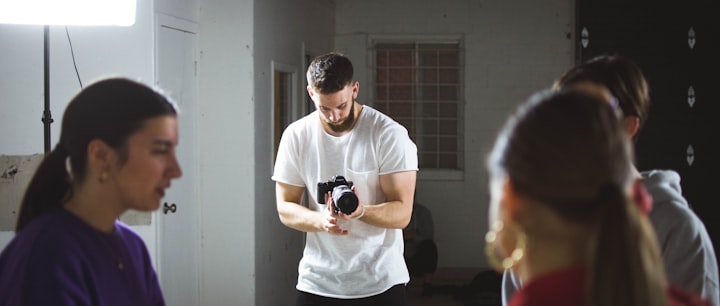How to Find and Develop Endless Research Ideas
The key to being a lead researcher

Every research project begins as a research idea. Therefore, to become a successful researcher, it is important to be able to develop research ideas.
Many people see the development of research ideas as something that only certain people can do; however, the truth is that the ability to develop research ideas is a skill. It takes time and practice to develop this skill. Asking others for topics and ideas does not allow you to build this skillset.
There are a few different ways to develop the skills of creating research ideas and with practice you could develop new research ideas practically on command. If you want a complete guide to go from learning your field to collecting publishable data, access my free 30 Day Research Jumpstart Guide!
Types of Research Ideas
Most research ideas fall into one of two categories: (1) Solving a problem and (2) Expanding research.
Solving a Problem
Many research ideas originate from a problem or issue. It doesn’t matter how small or big the issue is, if you can devise a way to fix the problem, you can create a new research project.
In my Ph.D. research, I worked on a project separating steroids through a technique called ion mobility spectrometry. One of the best ways to do this was to create dimers, which is where two molecules of the steroid attached to a metal and acts as a single unit. This worked well for many steroid pairs; however, some steroids would create heterodimers, which means 2 different steroids attached to the same metal.
To solve this problem, I developed the research idea to introduce LC to the workflow to separate those steroids that produced heterodimers. This became another research project that was published illustrating the solution to the problem in our previously published paper.
Expanding Research
Even if there is not a specific problem with research, you can still develop ideas based on how you can expand or translate this research.
Before my research identified the problem of heterodimers, I first had to develop the research idea to examine steroids with metals and ion mobility. From reading papers in my field, I identified a paper that had shown an increase in the separation of steroid pairs through metal adducted dimers. However, they only examined a single metal for this work, sodium.
Therefore, my first idea that started this research project was to expand the metals that were used. I tested 7 steroid pairs with all of the group I metals. The goal of this project was to find if there were metals better for separation than sodium. This idea began a project that resulted in three first-author papers.
Before You Develop Ideas
The difficult part in developing research ideas is not always in the actual development of your ideas. Instead, you must understand and know your field well. This takes time in reading papers and watching presentations in your field. However, this is an essential part of becoming a successful researcher.
Therefore, before you work on creating research ideas, you should create a plan to understand your field. This should include reading pertinent reviews, research papers, and presentations if they are available.
You need something to build off for your research ideas. This requires becoming very familiar with the research that has already been completed.
Exercises for Developing Ideas
As I said above, developing research ideas is a skill. The best way to build a skill is to have exercises that allow you to practice this skill. Therefore, there are three exercises that you can employ when reading papers or watching presentations in the field. These exercises are asking these questions at the end of the paper or presentation:
- What did the experts recommend should be done next?
- How can I expand this research?
- What problems were found in this paper?
What do the experts recommend should be done next?
Did you know that the experts in your field are constantly telling you what they think the next best research idea is?
Many people miss these expert recommendations, but they are there for all to see.
When you read your next paper, look at the conclusions very carefully. Generally, the author will put future directions in the conclusions. This is where the experts in this field will detail the ideas that they believe should be researched next.
Whenever you are reading a paper, have a notebook ready. Look specifically for the authors' recommendations. Write down the research ideas that you find.
This exercise will help you to develop the skills of identifying research ideas from others.
How can I expand this research?
To start developing your own ideas, the easiest step is to identify how you could expand the research in papers and presentations.
A simple way to do this to start is to identify the variables used in the research paper. You should include both independent and dependent variables, such as the disease examines, molecules measured, the thickness of a substrate, etc.
In your notebook, write down the different variables. Then, ask yourself how can this variable be changed?
This is exactly what I did to generate my ideas in the analysis of steroids using ion mobility. I read a paper that had multiple variables including, steroid pairs and metal adducts. I decided to develop a new research idea to expand the variable of metal adducts.
Using this exercise will help you to develop new research ideas for current projects and also develop the skill to create research projects on command later on.
What problems were in this paper?
The final exercise is to identify research problems in a paper and develop an idea to solve these problems. This can be the most challenging of the exercises because devising solutions can be difficult.
The process starts with identifying problems. These can be issues that authors discuss or can be issues that you identify. Once you have identified these issues, you should write these problems down in your notebook.
Then, it may take time, but think about how you would solve these issues. When you have an idea, write it down next to the problem.
This can be a new research idea that you can explore in the future. Practicing developing solutions to research problems will allow you to quickly generate projects in the future and quickly troubleshoot your own research projects.
Major Takeaways
- Developing research ideas is an essential skill for researchers. While at first it may seem impossible, it is easy to develop the skill of generating research ideas and well worth it.
- Most research ideas are either solving a research problem or expanding research.
- To be able to develop research ideas, you need to have a solid understanding of the research in your field.
- There are 3 exercises that you can use to generate endless research ideas in your field.






Comments
There are no comments for this story
Be the first to respond and start the conversation.